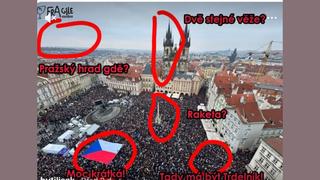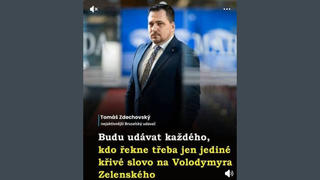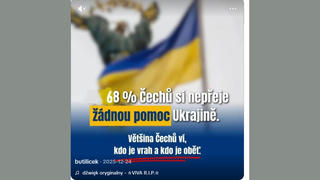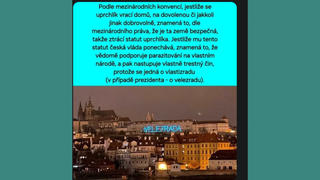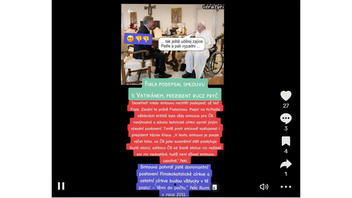
Is the Czech government hiding the content of the treaty, also known as the Concordat, signed with the Holy See in October 2024? No, that's not true: The treaty's text was published on several government websites right after it was signed. It still needs to be approved by both houses of the Czech parliament and ratified by the president to be valid.
The claim appeared in a video (archived here) published on TikTok on October 25, 2024. It shows an image of the Czech Prime Minister, Petr Fiala, meeting with Pope Francis. The text overlay in Czech, translated into English by Lead Stories staff, states that Fiala signed a treaty with the Vatican and it also denounces it, citing former Czech politicians -- including former Czech President Vaclav Klaus -- who were against such a treaty for the country, in the past. The text overlay also states that the treaty would give the Catholic Church a "privileged position" over other churches. The caption below the video reads in Czech, as translated:
Why are they hiding the contents of the contract, again? Why should the Catholic Church have a monopoly on faith and christianity? You don't need a church to do any of that.
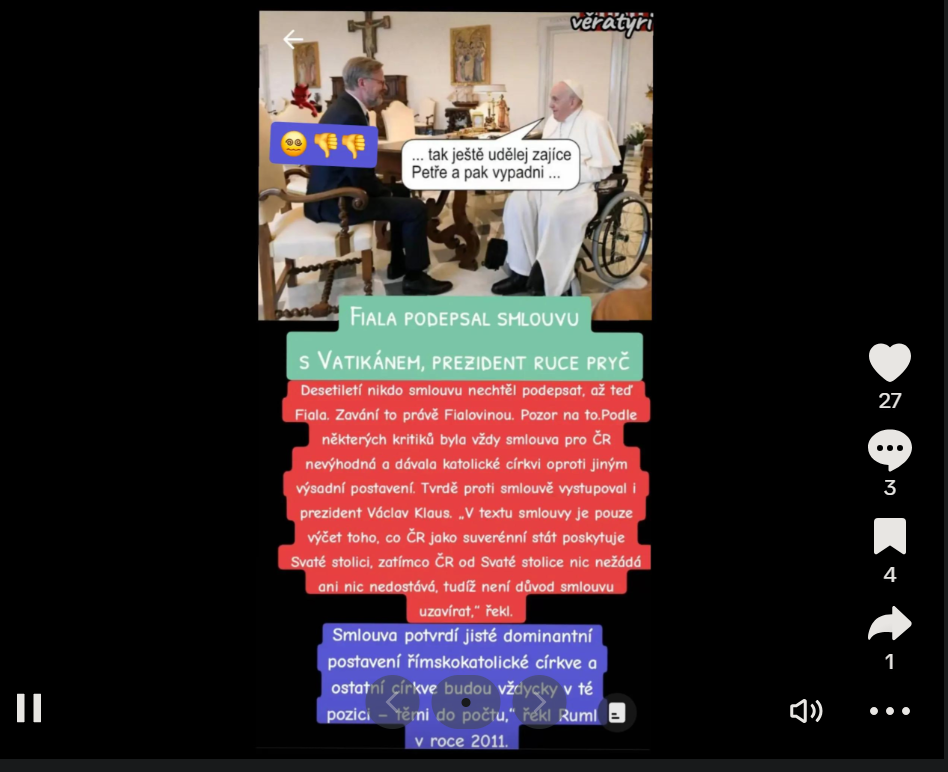
(Source: TikTok screenshot taken on Fri Dec 6 09:23:02 2024 UTC)
It is not true that the government is hiding the content of the treaty signed with the Holy See on October 24, 2024. The text of the treaty has been published or linked to, along with related statements, on the websites of the Czech government (archived here), and the Ministry of Foreign Affairs (archived here) after it was signed. It was made public a day before the above video was shared on the TikTok platform on October 25, 2024. As both the government and the ministry note, the treaty is not valid until it is approved by both chambers of parliament and ratified by the president.
Czech Prime Minister Petr Fiala signed the Concordat with Cardinal Pietro Parolin, the Vatican's Secretary of State, and reaching such a treaty was part of the Czech ruling coalition platform, according to the Ministry of Foreign Affairs statement linked above. Fiala says in the statement that the treaty is "mutually balanced" and "fully" respectful of the Czech legal order, and it clarifies some "contentious" issues and procedures, such as cooperation between the state and churches in providing spiritual services in health and social care institutions, or the army, police or prison, which had not been previously addressed.
The text of the treaty, which can be downloaded from the Czech Foreign Affairs Ministry website (archived here) states that the Czech Republic will guarantee full freedom of thought, conscience, and religion under its legal system. As per Article 3 of the text, the country will also guarantee the right to refuse military service or medical services on grounds of conscience or religion under conditions established by law. It will give ecclesiastical marriages the same validity and legal status as civil marriages, the text states.
In its statement, the ministry also notes that the Czech Republic's last agreement with the Holy See dates back to 1928, a so-called modus vivendi (archived here), which ceased to be applied after communists took power in 1948.
The Vatican has at least one international treaty with 25 European countries, including Switzerland, Poland, Estonia, and Sweden, according to a list of the Holy See's bilateral treaties (archived here), while some countries have more than one in place. All of the Czech Republic's neighbours, Austria, Germany, Poland, and Slovakia, have already signed such treaties, and each of Germany's federal states also has one with the Holy See, the list shows.
The text overlay on the above TikTok video also claims that the treaty would give a monopoly to the Catholic Church, which would then be privileged over other churches. This is not true as the treaty regulates relations between the Czech Republic and the Catholic Church specifically, but it also contains "elements of promoting cooperation" with other churches, Magdalena Machulova, a spokesperson of the Czech Conference of Bishops (archived here) wrote in an email to Lead Stories on December 6, 2024.
Machulova cites Article 13 (par. 2) of the treaty, which confirms the practice of cooperation in categorical pastoral care among the Catholic Church, the state, and other churches and religious communities. Categorical pastoral care is defined as spiritual care (archived here), provided to the general public, for anyone who asks for it.
Machulova also notes that the Czech Republic´s Constitution guarantees freedom of religion and that the treaty cannot in "any way" restrict the rights of other churches and religious groups. Their equal rights are provided by the Act on Churches and Religious Societies (archived here) Machulova wrote.
(Source: Screenshot of the paragraph cited above from the text of the treaty downloaded from the Czech Foreign Affairs Ministry website taken on Mon Dec 9 09:23:02 2024 UTC)
The government´s statement from October 24, 2024, also cites Tomas Tyrlik (archived here), the head of the Ecumenical Council of Churches in the Czech Republic, as welcoming the treaty as it contributes to the protection of spiritual, human and cultural values not just of the Catholic Church but also of other churches and religious communities in the country.
In the past, such a treaty, signed by the then Czech government in 2002, proved too controversial to be adopted by lawmakers in one of the most atheistic countries worldwide (archived here), which approved property restitutions to churches (archived here) only in 2012, decades after the fall of the communist regime.
In 2002, the parliament failed to ratify the government´s treaty between the country and the Holy See (archived here). Its opponents included former Czech President Vaclav Klaus, who considered it disadvantageous for the Czech Republic.
Currently, the text of the new treaty has been distributed to lawmakers on November 1, 2024, and the parliament´s upper chamber is set to do the first reading in one of its 2024 remaining sessions (archived here). The legislative process for approving and ratifying international treaties in the Czech Republic is outlined here (archived here).
This time, the main controversy concerns confessional secrets and who they may affect. A Czech independent senator, Vaclav Laska, said on December 5, 2024, that he would vote against the treaty (see screenshot below) because of the wording in the text that gives the right to keep confessional secrets to "pastoral workers" without clearly stating who they are.
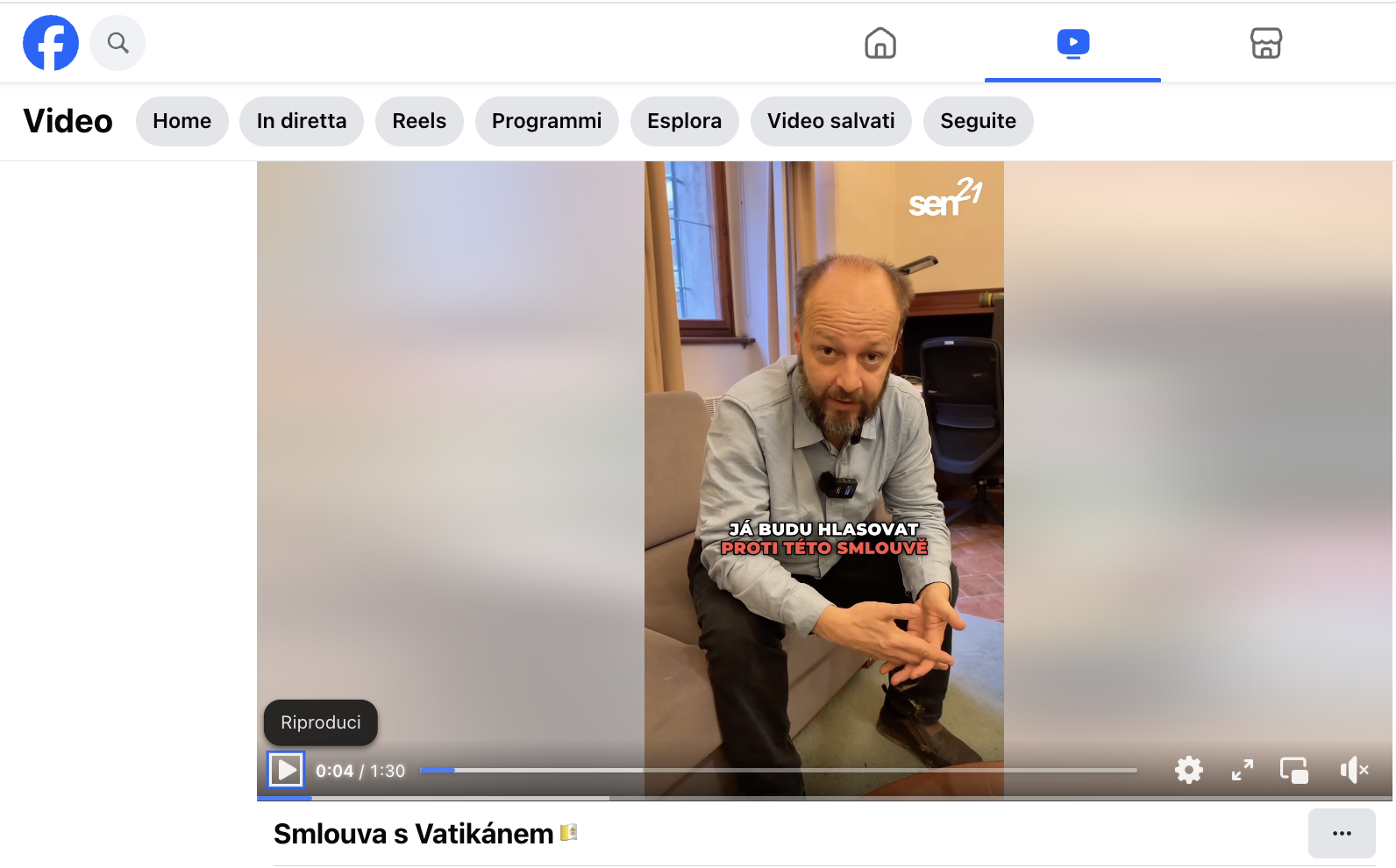
(Source: Facebook screenshot taken on Thu Dec 12 09:38:23 2024 UTC)
Laska also said on December 11, 2024, in a Senate press briefing that a group of senators is preparing a proposal according to which the Constitutional Court should assess the compliance of the treaty with the Czech Republic´s constitutional order. The proposal should be ready by the end of 2024, Laska said.


